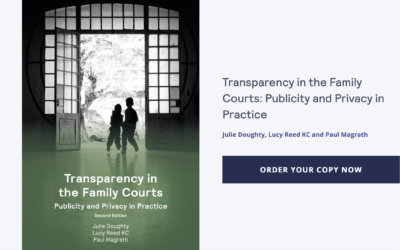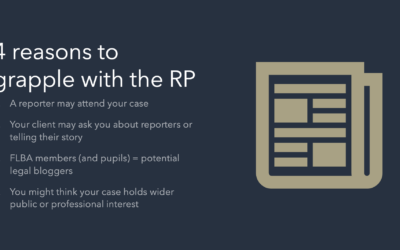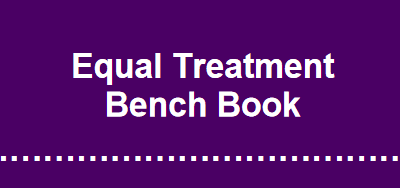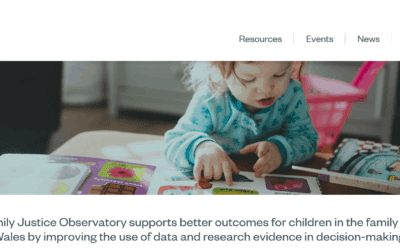Guidance Notes
Updated Guidance – What to do if a reporter attends (or wants to attend) your hearing – Pilot and Non-Pilot Court versions
This time last year we produced a guidance note for judges and lawyers to help them navigate the relatively unfamiliar scenario of a reporter rocking up at court. That guidance note was endorsed by the Financial Remedies Court subgroup of the Transparency...
New Guidance note – What to do if a reporter attends your hearing
As the Transparency Reporting Pilot is about to launch, we thought it would be helpful if we gathered together some helpful tips for those who may be about to encounter journalists and legal bloggers in their courtrooms for the first time. Tip number one : Don't...
Section 20 accommodation of children (‘voluntary accommodation / care’) Guidance Note
This document explains section 20 of the Children Act 1989 and the equivalent piece of law in Wales (s76 Social Services & Wellbeing (Wales) Act 2014), sometimes called 'voluntary care' or 'voluntary accommodation'. Version 4 of this guidance note (January 2022)...
Remote Court Hearings Guidance Note
This short guide explains what remote court hearings are and how they will work. It answers some common queries that users may have. We hope that it will be useful for parents involved in family court cases about their children - or for anyone else involved in family...
Common Law Marriage Guidance Note
We have produced a guidance note about the myth of common law marriage and the rights of people who live together as a couple, but who aren't married or in civil partnerships. You can view or download the guidance note here. This is v2 (March 2019).
Domestic Abuse Guidance Note
We have produced a guidance note to explain how family courts deal with cases where there are allegations of domestic abuse. You can view or download the guidance note here. This is v2 (December 2018) which is very slightly modified since v1 in November 2018....
The use of experts in family court cases involving children – guidance note
We have written this guide for families and those working with and supporting them. You can view the online version or download a pdf (version 2 Jan 2019).
Guidance on parents recording meetings with social workers
NB In May 2018 the Data Protection Act 1998 was repealed and replaced with a new Data Protection Act 2018, which sits alongside the GDPR. We have withdrawn this guidance note until we are able to update it to reflect those changes.
Publication of Family Court Judgments – guidance note
We have written this guide for families and those working with and supporting them. You can view the online version or download a pdf.
Media Guide
We have produced a short guide for journalists and bloggers, explaining what the rules are around reporting family court proceedings. See Media Page. This page is in need of some updating, but we've decided to await the outcome of The President's Transparency Review...
Other Resources
New research shows domestic abuse issues ‘fall by the wayside’ in making decisions about children
The Domestic Abuse Commissioner for England and Wales (DAC) this week published a report, Everyday Business: Addressing domestic abuse and continuing harm through a family court review and reporting mechanism by Mandy Burton and Rosemary Hunter, Loughborough...
Updated Guidance: What to do when a reporter attends your hearing
We first published our Guidance Note 'What to do when a reporter attends (or wants to attend) your hearing' in 2023. Later, we updated it to account for the expansion of the Reporting Pilot and introduction of the Financial Remedies Pilot, developing two versions, one...
New court rules allow more reporting from family courts
What was introduced as the Reporting 'Pilot' in 2023 is now a permanent change in family courts, to allow more reporting by journalists and legal bloggers. Within a few months, reporting will be easier in almost all family court cases. The changes are being rolled out...
New practice guidance on intermediaries in family courts
New practice guidance ‘The use of Intermediaries, Lay Advocates and Cognitive Assessments in the Family Court’, was issued by the President of the Family Division on 23 January. The guidance is quite brief and refers to three court judgments delivered over the...
Updates on the operation of family courts – mainly about delay
Two important resources for family court users and professionals were published at the end of November: a webinar to ‘Refocus on the Public Law Outline (PLO)’ and a Family Court Annual Report that covers the year 2023-2024 - although it’s the first annual report on...
It’s out! New edition of Transparency in the Family Courts
"The publication of this excellent book is extremely welcome," said Sir Andrew McFarlane when Transparency in the Family Courts: Publicity and Privacy in Practice, written by three of our trustees, Julie Doughty, Lucy Reed KC and Paul Magrath, was first published, in...
Reporting Pilot Expansion – training video for lawyers
On Monday 29 Jan the (children) Reporting Pilot expanded to a whole host of new courts across England and Wales, and a new Financial Remedy Reporting Pilot began. Overall this will vastly increase the potential for reporters to observe and write about the work of the...
Updated Guidance – What to do if a reporter attends (or wants to attend) your hearing – Pilot and Non-Pilot Court versions
This time last year we produced a guidance note for judges and lawyers to help them navigate the relatively unfamiliar scenario of a reporter rocking up at court. That guidance note was endorsed by the Financial Remedies Court subgroup of the Transparency...
Hague Mothers
'A good law gone bad' is how the Hague Convention on International Abduction was described in a session organised by the Filia Hague Mothers project at an international feminist conference held in Cardiff over the weekend. The Convention was drafted in 1980 and...
The Equal Treatment Bench Book – guidance on fairness for judges
UPDATE 25.03.24: We've now seen that there's a revised 2023 version here. We've just noticed that a revised version of this lengthy document (566 pages!) has been issued online, so we looked for any references to transparency. What we found is brief and out of date....
Defining expertise
There has been a lot of discussion recently about experts in the family court, prompted partly as a result of the recent publication of a 'memorandum' on the topic by the President of the Family Division, and partly as a result of some recent press coverage relating...
Remote Court Hearings Guidance Note
This short guide explains what remote court hearings are and how they will work. It answers some common queries that users may have. We hope that it will be useful for parents involved in family court cases about their children - or for anyone else involved in family...
Nuffield Family Justice Observatory: Supporting better outcomes for children through research
Some readers may remember the 'research-led family justice system' envisaged in the Norgrove Family Justice Review in 2011. However, we're still waiting and, as Sir James Munby explained in this interview, family court professionals can sometimes feel that they are...
TP Launches information leaflet about legal blogging
Now that the legal blogging pilot has been extended in duration we thought it would be helpful to produce a short information leaflet that can be provided to people whose cases a legal blogger wants to observe. We hope that the information will give both litigants and...
How far should family law reflect modern family life? The case of cohabitation, equal civil partnerships and the common law marriage myth
This is a Guest Post by Anne Barlow FAcSS; Professor of Family Law and Policy and Associate Dean for Research, College of Social Sciences & International Studies at the University of Exeter. This was originally posted in the ESRC Society Now magazine as a feature...
Joint Research : CAFCASS and Women’s Aid
CAFCASS and Women's Aid have collaborated on research about allegations of domestic abuse in child contact cases. We published a guest post by psychologist Sue Whitcombe on this here : Looking beyond the headlines: domestic abuse allegations in family proceedings. We...
Young Parents Advice
The Family Rights Group have developed a website to support young parents whose children are deemed 'at risk', in care or adopted. The site aims to share legal and practical information to help more young mothers and fathers and young parents-to-be to keep their...
Attachment
Attachment is a technical psychological term with a specific meaning, but it is used an awful lot in care proceedings and other cases about children, including by people who are not psychologists. It doesn't help that attachment has a meaning in everyday language,...
Children Law for dummies!
Andrew Pack, Transparency Project member, has written some really useful basic explanations of the law relating to family law (children) - primarily for social workers, but also helpful or any other non-lawyer wanting an accessible explanation. Law for social workers...
Reporting restrictions in the criminal courts
Guidelines on Reporting Restrictions in the Criminal Courts issued jointly by the Judiciary, the News Media Association, the Society of Editors and the Medial Lawyers Association have now been revised, as of May 2016. You can download the full PDF here. We have now...











